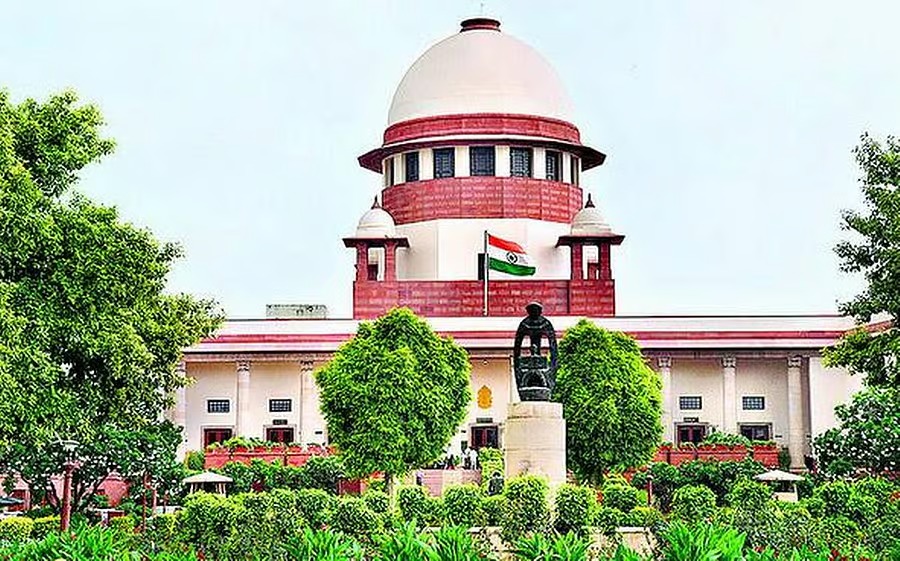S. Ravindra Bhat, J.@mdashThis appeal is directed against a judgment and order of the learned Single Judge, dismissing writ proceedings under Article 226 of the Constitution-W.P. (C) 10499 and 10500/2004, initiated by the appellants, against the Delhi Development Authority ("DDA") seeking certain directions. The appellants were aggrieved by a decision of DDA to carve out small plots on the land designated as institutional housing, proposing it for allotment to slum dwellers sought to be settled as a consequence of relocation. Land comprised in Pocket-11 was earmarked, partly for carving plots to be allotted under the scheme of "Large Scale Acquisition Development and Disposal of Land in Delhi" formulated in 1961 and partly for institutional housing. The appellants were allotted a plot bearing No. 26 admeasuring 208.93 sq. mtrs. in Pocket-11 according to their entitlement, as their lands too had been acquired. The appellants had argued that since they accepted a plot, which was offered to them on the basis of the existing Zonal Development Plan, DDA was estopped from changing use of the land designated as institutional housing. It was also argued that without amending the Zonal Development Plan, DDA could not change the land use. The appellants had, besides urging estoppel, submitted that earmarking of the lands in question amounted to unauthorized change of provisions of the Master Plan which could not have been resorted to. It had initially been argued that the earmarking of lands for relocation of slum dwellers amounted to illegal diversion of acquired lands, and no longer permissible, on account of a Division Bench ruling in
2. The DDA''s stand was that the Zonal Development Plan designated land use as "housing/residential", in respect of the disputed site though for institutional housing and that as long as land use was not changed, it was irrelevant whether it was used for the purpose of residence of slum dwellers or residence of those employed in institutions. The Lay Out Screening Committee of DDA considered population density norms prescribed by Master Plan Delhi-2001. It found that if 236 plots measuring 18 sq. mtrs. and 664 plots admeasuring 12.5 sq. mtrs. were carved out on the land in dispute and allotted to slum dwellers, such population density norms would not be adversely affected. DDA argued that Master Plan norms relating to population density were adhered to. The DDA stated that carving out residential plots on the lands in question was not by violating the Master Plan or Zonal Development Plan. DDA also contended that micro level layout planning is legally sanctioned and relied on several judgments to the effect that the same is within the domain of DDA, without necessity of amending the Master Plan or Zonal Development Plan.
3. The contentions of the appellant based on Wazirpur Barton Nirmata Sangh (supra) were not held to be maintainable because there were no pleadings in the writ petition to that effect. The Single Judge also stated that it was unknown whether slum dwellers being relocated had created a slum prior to the cut-off date prescribed by Division Bench of this Court. The learned Single Judge also held that the argument of promissory estoppel was inapplicable, since the powers of DDA could not be precluded by invoking such doctrines. Likewise, it was held that the argument (of the appellants) based on the principle of legitimate expectation was unmerited. The Court relied on the decision reported as
4. The learned Single Judge held that the appellants'' writ petition had no merit. After considering and analyzing provisions of the Delhi Development Authority Act, 1957, especially Sections 7, 8, 9, 10 and 11, it was held that there was no change in the land use, which violated the provisions of the said Act and Regulations. The learned Single Judge concluded that:
XXX
32. There is no violation of the Delhi Development Act., Designated land use continues to be residential.
33. Before parting, I may note that one of the principle cause of proliferation of slums in Delhi is that DDA has not been earmarking housing for the weaker sections of the society around industrial estates and residential colonies. The concept of a service personnel block is conspicuously absent while developing residential and industrial estates. Low placed hands are required whether in an industrial or domestic sector. People would be attracted where jobs are to be found. Past experience shows that small clusters have come up around residential and industrial areas where jobs are available. Commensurate with the anticipated jobs which would be available as a result of residential areas as also industrial complex coming up, had DDA with foresight provided land for the economically weaker sections of the society to set up their homes, problem would not have arisen. When I look to the Zonal Development Plan relied upon, I do not find any land earmarked for the economically weaker sections of the society. The entire area shows that only Pocket-7 has been earmarked as Janta Flats. All other areas are marked for either alternative plots, low income group, middle income group and cooperative group housing society allotments.
34. The proposed allotment by DDA would harmonise and synthesize the have not with the haves. It cannot be lost sight of that cheap housing results in cheap labour being available for the better of the society. It ultimately serves a social purpose
XXX
5. Mr. D.K. Rustagi, learned counsel for the appellants, argued that the learned Single Judge fell into error in holding that there was no violation of the Act or rules framed thereunder. It was contended that the diversion from the originally designated land use in respect of the lands in question from institutional housing to residential for slum dwellers, on re-location basis amounted to abuse of power and violation of provisions of the Delhi Development Act. It was submitted in this regard that if such blatantly unauthorized use were left unhindered, DDA would be permitted to create a fraud on the power and the statute, with impunity. It was argued that the present matter is not merely one of procedure, but also substance. Counsel stressed that if the DDA''s position were to be accepted, such radical land use change, based on allotment of lands for an entirely different purpose, would result in unacceptable burden on the amenities made available to residents in the locality, which in turn would lower the quality of life, if not collapse of civil amenities.
6. The DDA argues that the findings of the learned Single Judge do not warrant any interference. In this context it was submitted that the original land use was institutional use for residence; now it is again residential use. The question of the DDA invoking any specific power, or the use amounting to a clandestine diversion did not arise.
7. The appellants'' case in the writ petitions were that DDA was estopped from changing the land use, or more specifically, from making any changes to the use of the lands. There is no dispute that originally, the use for which the land was to be put, was institutional residence. Equally, those like the petitioner were allotted land on the basis of existing policy of the executive Government which entitled them to alternative plots, since their lands were acquired. Instead of institutional residence, i.e. allotment of the lands in question to societies which would then have developed the land, constructed flats and allotted them to their members, DDA thought it fit to allot it as a measure of rehabilitation of slum dwellers. This Court is in agreement with the view of the learned Single Judge that the appellants have not shown how the Master Plan or the Zonal Development Plan was violated by earmarking the lands in question for residence of erstwhile slum dwellers. It was held-and we think, correctly, that nothing in the Master Plan, especially its Use Zones, or the Development Codes is attracted to the kind of change that was brought about by DDA. Nor was the layout planning in the present case in any manner contrary to law. As noticed, the previous use designated for the lands were residential; it continues to be so. The appellants were unable to establish whether and if so, to what extent, the pressure on amenities and common facilities increased as to seriously deprive the enjoyment of their properties-which consideration would have been material, if at all, in the circumstances of the case. It is not as if the appellants had any manner of right in the lands that are the subject matter of these proceedings; they were never designated as parks, open spaces or generally available for use by the community.
8. Development of urban areas and cities is an ongoing process. It has to reflect the larger demographics of the area. It is vitally important for planning and development agencies to designate lands not only for those who aspire for better houses, but also for those who out of compulsion inhabit public spaces. In a democracy where the largest percentage of population live at subsistence or below subsistence levels, the obligation to ensure cheap and subsidized housing to those who do not possess any meaningful shelter, is upon the State. If, like in this case, it makes an attempt to discharge that obligation, Courts should be careful and circumspect in disturbing that exercise. This Court is of the opinion that there is no infirmity with the action of the DDA; the appeal has to consequently fail. It is accordingly dismissed along with pending application with no order as to costs.

